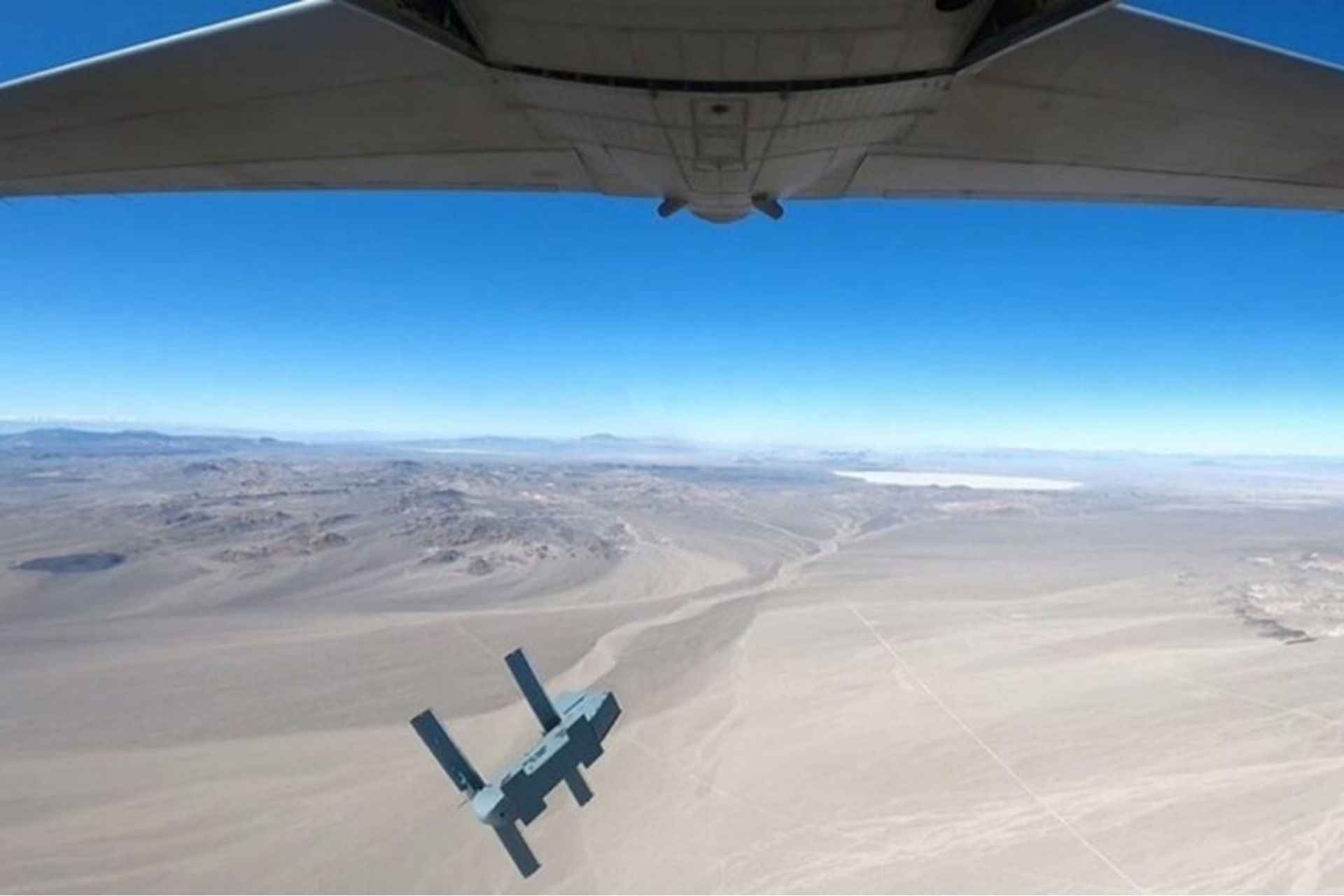Silent Arrow Wins Contract for US Air Force CLS-300 Cargo Drone Testing

{loadposition bannertop}
{loadposition sidebarpub}
The American company Silent Arrow has secured a contract to test its contested logistics system, the CLS-300, an autonomous cargo drone designed for the US Air Force. This $1.2 million contract represents a new phase in the project led in collaboration with AFWERX, the innovation arm of the US Air Force. The CLS-300 project aims to develop a long-range cargo transport platform, specifically adapted for missions in challenging environments.
Follow Army Recognition on Google News at this link
Silent Arrow’s partnership with the US Air Force dates back to 2021, when the GD-2000 was first deployed for testing (Picture source: Silent Arrow)
The CLS-300 is notable for its substantial payload capacity of 1,000 pounds (454 kg) and an estimated range between 300 and 500 nautical miles (approximately 556 to 926 km). Based on the commercially successful GD-2000, the world’s first heavy-payload, autonomous cargo glider capable of carrying 1,500 pounds over 35 nautical miles, the CLS-300 system introduces an innovative propulsion and propeller system, extending its range nearly tenfold. Unlike the GD-2000, which operates as a glider, the CLS-300’s powered system enables it to travel farther and to operate from various launch points, including ground surfaces and naval vessels. The drone can be launched from military cargo aircraft like the Lockheed Martin C-130, Boeing C-17, and Airbus A400M, as well as from unimproved terrain, enhancing its adaptability in remote and contested zones.
Silent Arrow’s CLS-300 tests will be conducted under the US Air Force’s Small Business Innovation Research (SBIR) and Small Business Technology Transfer (STTR) programs. These initiatives aim to stimulate technological innovation by facilitating collaboration with medium-sized businesses, and expediting the development of advanced military solutions. The project leverages Silent Arrow’s expertise, which includes over 20 patents, six Fédération Aéronautique Internationale (FAI) world records, and recognition as a finalist for the Robert J. Collier Trophy for its innovations in autonomous cargo delivery.
The GD-2000 is a heavy-lift glider drone designed for resupply and relief missions (Picture source: Silent Arrow)
Silent Arrow’s partnership with the US Air Force dates back to 2021, when the GD-2000 was first deployed for testing. The GD-2000 demonstrated its capabilities in a foreign deployment test in 2022, transporting equipment that exceeded its theoretical maximum payload. Chip Yates, Silent Arrow’s CEO and founder, emphasized the significance of this Phase II contract, noting the company’s plans to commence propulsion tests for the CLS-300 in early 2024, followed by full-scale flight tests in the second half of the year. This accelerated timeline reflects the company’s commitment to swiftly delivering this critical capability for both military operations and humanitarian missions in challenging environments.

{loadposition bannertop}
{loadposition sidebarpub}
The American company Silent Arrow has secured a contract to test its contested logistics system, the CLS-300, an autonomous cargo drone designed for the US Air Force. This $1.2 million contract represents a new phase in the project led in collaboration with AFWERX, the innovation arm of the US Air Force. The CLS-300 project aims to develop a long-range cargo transport platform, specifically adapted for missions in challenging environments.
Silent Arrow’s partnership with the US Air Force dates back to 2021, when the GD-2000 was first deployed for testing (Picture source: Silent Arrow)
The CLS-300 is notable for its substantial payload capacity of 1,000 pounds (454 kg) and an estimated range between 300 and 500 nautical miles (approximately 556 to 926 km). Based on the commercially successful GD-2000, the world’s first heavy-payload, autonomous cargo glider capable of carrying 1,500 pounds over 35 nautical miles, the CLS-300 system introduces an innovative propulsion and propeller system, extending its range nearly tenfold.
Unlike the GD-2000, which operates as a glider, the CLS-300’s powered system enables it to travel farther and to operate from various launch points, including ground surfaces and naval vessels. The drone can be launched from military cargo aircraft like the Lockheed Martin C-130, Boeing C-17, and Airbus A400M, as well as from unimproved terrain, enhancing its adaptability in remote and contested zones.
Silent Arrow’s CLS-300 tests will be conducted under the US Air Force’s Small Business Innovation Research (SBIR) and Small Business Technology Transfer (STTR) programs. These initiatives aim to stimulate technological innovation by facilitating collaboration with medium-sized businesses, and expediting the development of advanced military solutions.
The project leverages Silent Arrow’s expertise, which includes over 20 patents, six Fédération Aéronautique Internationale (FAI) world records, and recognition as a finalist for the Robert J. Collier Trophy for its innovations in autonomous cargo delivery.

The GD-2000 is a heavy-lift glider drone designed for resupply and relief missions (Picture source: Silent Arrow)
Silent Arrow’s partnership with the US Air Force dates back to 2021, when the GD-2000 was first deployed for testing. The GD-2000 demonstrated its capabilities in a foreign deployment test in 2022, transporting equipment that exceeded its theoretical maximum payload. Chip Yates, Silent Arrow’s CEO and founder, emphasized the significance of this Phase II contract, noting the company’s plans to commence propulsion tests for the CLS-300 in early 2024, followed by full-scale flight tests in the second half of the year. This accelerated timeline reflects the company’s commitment to swiftly delivering this critical capability for both military operations and humanitarian missions in challenging environments.




